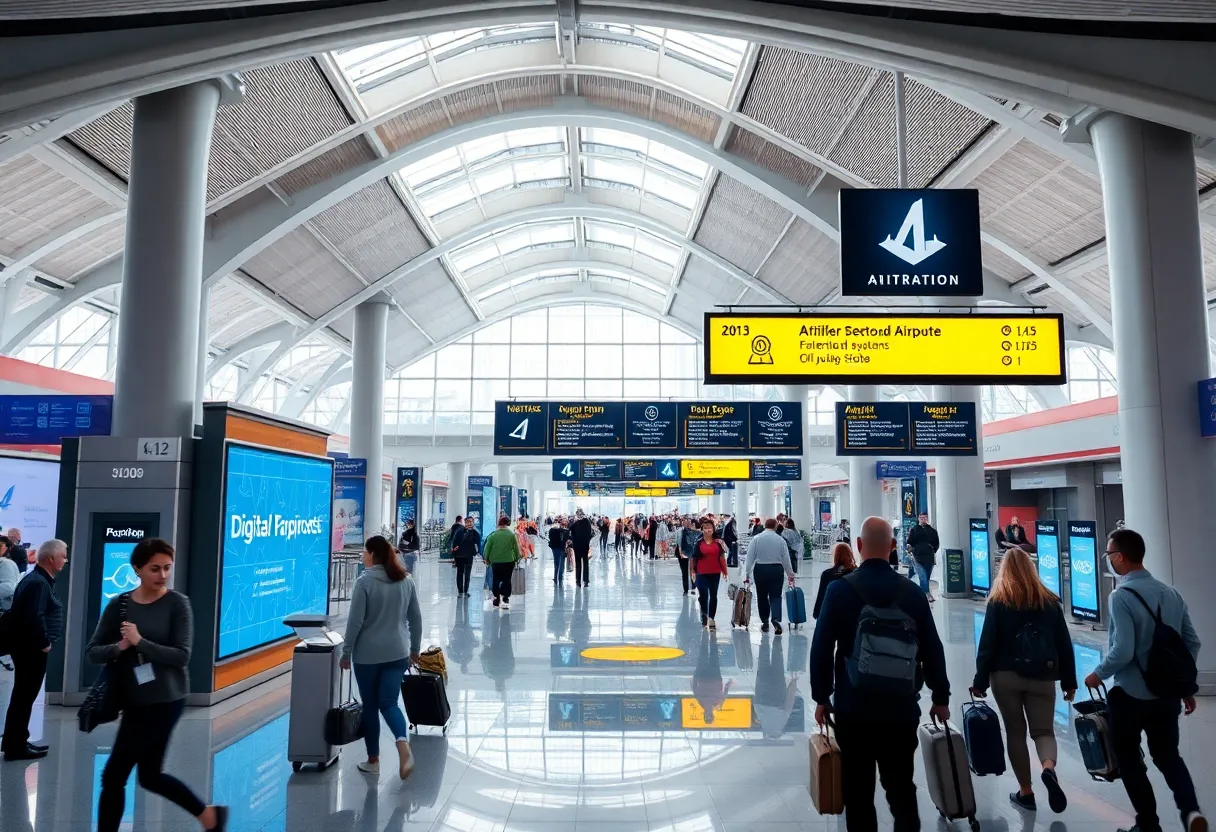News Summary
India’s aviation sector is undergoing a digital transformation as major airports deploy advanced technologies to enhance operations. From artificial intelligence and biometrics to centralized operations control centers, airports are focused on streamlining processes, improving safety, and elevating passenger experiences. Initiatives like the Digi Yatra aim to create a contactless, paperless travel experience while addressing ongoing challenges from heightened safety protocols. Key projects include the establishment of intelligent terminals and comprehensive cybersecurity strategies. The government plans to develop more airports and improve connectivity in the coming years, ensuring a robust future for the aviation industry.
India’s Aviation Sector Embraces Digital Transformation Amid Flight Disruptions
India’s aviation sector is undergoing a significant technological revolution as airports across the country increasingly adopt advanced digital solutions. This transformation aims to improve operations, ensure safety, and enhance the overall experience for passengers, despite ongoing disruptions affecting flights.
In a bid to streamline airport processes, major airports such as Delhi, Mumbai, Bengaluru, and Hyderabad are transitioning to smart terminals powered by an array of integrated digital technologies. These innovations encompass artificial intelligence (AI), biometrics, digital twins, and predictive analytics, all of which are reshaping the airport experience.
Digi Yatra: Paving the Way for a Contactless Experience
The government’s Digi Yatra initiative is at the forefront of this transformation, using biometric-based entry and boarding systems to facilitate contactless and paperless movement throughout terminals. The initiative aims to serve 90% of India’s domestic flying population and has plans for international pilot projects set to launch in 2025.
Advancements in Baggage Management
The management of baggage is also undergoing a transformation, utilizing AI-driven reconciliation systems and automated sorting technologies. Airports like Hyderabad and Bengaluru are now employing biometric-enabled self-bag drop kiosks, allowing for seamless luggage check-in.
Furthermore, AI-powered CT scanners and inline baggage handling systems are implemented at Trichy and Mumbai airports, providing real-time tracking capabilities and enhancing security protocols.
Centralized Operations and Predictive Analytics
Centralized Airport Operations Control Centres (AOCCs) have improved coordination among airport authorities, airlines, and ground staff, enabling real-time management of operations. The integration of predictive analytics powered by AI and machine learning has optimized various aspects of airport operations, including gate allocation, aircraft turnaround, and runway occupancy.
A shining example is Delhi’s Unified Total Airside Management (UTAM) system, which combines IoT and AI technologies to monitor vehicles at the airport, predict delays, and finely tune operations based on real-time data.
Enhancing Safety and Efficiency with Updated Systems
Safety and operational efficiency are being bolstered with upgrades to the Instrument Landing System (ILS) at Chennai, Bengaluru, and Hyderabad airports, which have proven beneficial in low-visibility conditions.
Modern airports, such as Bengaluru’s newly built Terminal 2 and the upcoming Noida International Airport, are utilizing Building Information Modelling (BIM) for efficient design and construction processes, ensuring that these airports are equipped with the latest technologies.
Cybersecurity Measures in Place
As digital transformations progress in airports, comprehensive cybersecurity strategies are being developed to safeguard airport networks, passenger data, and infrastructure from potential cyber threats.
Government Expansion Plans Amid Challenges
The Indian government has ambitious plans, aiming to develop an additional 50 airports and connect 120 new destinations within the next five years to support the growth of the aviation sector. However, despite these technological advancements, the industry continues to face considerable challenges, including ongoing flight disruptions.
Recent events have highlighted these issues, with various flights experiencing cancellations and emergency landings due to bomb threats and technical difficulties. Significant incidents have included the cancellation of flights like AI159 from Ahmedabad to London and AI180 from San Francisco to Mumbai, particularly noting the disruptions on June 17, 2025.
Impact of the AI171 Crash
The ongoing crisis within the aviation sector has been exacerbated by the heightened safety protocols implemented following the tragic Air India flight AI171 crash, which resulted in the loss of 241 lives. Investigations are currently underway, focusing on advanced Boeing 787 systems and possible software flaws that may have contributed to the incident.
As India’s aviation sector navigates this combination of rapid digital advancement and pressing safety concerns, stakeholders must work to adapt and ensure a balance between technological innovation and passenger safety.
Deeper Dive: News & Info About This Topic
Additional Resources
- Financial Express: Flight Disruptions in India
- Wikipedia: Aviation in India
- CNBC TV18: Indigo Flight Grounds
- Google Search: aviation technology India
- The Hindu: Air India Flight Snag
- Encyclopedia Britannica: Air Transport
- Times of India: Air India Boeing Grounded
- Google News: India aviation flight disruptions
Author: Construction CA News
The CALIFORNIA STAFF WRITER represents the experienced team at constructioncanews.com, your go-to source for actionable local news and information in California and beyond. Specializing in "news you can use," we cover essential topics like product reviews for personal and business needs, local business directories, politics, real estate trends, neighborhood insights, and state news affecting the area—with deep expertise drawn from years of dedicated reporting and strong community input, including local press releases and business updates. We deliver top reporting on high-value events such as the Rose Parade, Coachella, Comic-Con, and the California State Fair. Our coverage extends to key organizations like the California Building Industry Association and Associated General Contractors of California, plus leading businesses in technology and entertainment that power the local economy such as Apple and Alphabet. As part of the broader network, including constructionnynews.com, constructiontxnews.com, and constructionflnews.com, we provide comprehensive, credible insights into the dynamic landscape across multiple states.


